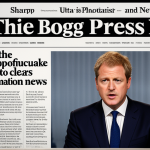Overview of Emerging Trends in UK Politics
The landscape of current UK politics is marked by significant emerging UK political trends that reflect broader shifts within society. One prominent trend is the increasing polarization seen across the political spectrum, driven by divergent views on economic policies, immigration, and national identity. This polarization fuels intense parliamentary debates and influences voter alignment.
Societal, cultural, and technological factors play critical roles in shaping these trends. For example, digital media platforms have accelerated the flow of political information, amplifying grassroots movements and facilitating swift responses to political events. Demographic changes, including a more diverse population, are also reshaping political priorities and policy demands.
Also read : How is the UK press handling misinformation and fake news?
The pace of change in the UK political arena is rapid. Traditional party loyalties are shifting, and new political actors continue to emerge, reflecting the public’s desire for alternative voices. These dynamics make for a fluid situation where political shifts are not only expected but are becoming the norm. Awareness of these emerging UK political trends is essential for understanding the direction of the UK’s governance and policy formulation.
Societal Impact of New Political Dynamics
Understanding the societal impact of evolving political ideologies is crucial for grasping how public opinion shapes and is shaped by current UK politics. As emerging UK political trends redefine traditional beliefs, voter behaviour exhibits notable changes. Increasing political engagement among younger demographics contrasts with growing scepticism among older voters, reflecting a complex shift in trust toward political institutions.
In parallel : How Might Recent Policies Impact the UK’s Role in Global Affairs?
Public responses often manifest through civic participation, including protests and grassroots campaigns. These movements highlight how societal groups react to policy shifts and perceived political disconnect. For instance, widespread protests on climate policy and social justice illustrate how political shifts engage and mobilize diverse communities beyond conventional electoral processes.
The evolving landscape also impacts overall political engagement levels, with digital platforms offering new avenues for dialogue and activism. However, these developments sometimes deepen societal divisions, complicating consensus-building efforts. Recognizing these dynamics helps explain how political trust and voter turnout fluctuate as part of a broader societal response to emerging UK political trends influencing the nation’s political fabric.
Policy Change and Legislative Developments
Emerging UK political trends significantly shape legislation and policy implications within Parliament. These trends guide the government’s agenda, prompting shifts in legislative priorities to address evolving public concerns. For instance, recent government initiatives increasingly focus on healthcare reforms, climate change policies, and education system improvements, reflecting the influence of grassroots movements and public demand for transparency and accountability.
Specific bills showcase the impact of these political shifts. Climate legislation, such as net-zero targets and renewable energy incentives, demonstrate responses to environmental activism embedded within current UK politics. Likewise, healthcare reforms aim to tackle challenges highlighted by demographic changes and societal needs, reinforcing the policy implications of shifting political landscapes.
These government initiatives underscore how the pace of change in UK politics accelerates legislative responses. Innovative policy development now often incorporates diverse stakeholder input, ensuring that reforms are responsive to the dynamic nature of public opinion and emerging political priorities. Understanding these legislative trends is essential for appreciating the continual reform process that molds the UK’s domestic policy framework.




